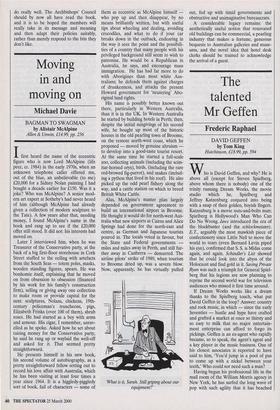Moving in and moving on
Michael Davie
BAGMAN TO SWAGMAN by Alistair McAlpine Allen & Unwin, f14.99, pp. 256 Ifirst heard the name of the eccentric figure who is now Lord McAlpine (life peer, Cr. 1984) in the early 1970s, when an unknown telephone caller offered me, out of the blue, an unbelievable (to me) £20,000 for a Sidney Nolan painting I had bought a decade earlier for £150. Was it a joke? Who was McAlpine? A senior mod- ern art expert at Sotheby's had never heard of him (although McAlpine had already given a collection of modern sculpture to the Tate). A few years after that, needing money, I found McAlpine's name in the book and rang up to see if the £20,000 offer still stood. It did not: his interests had moved on.
Later I interviewed him, when he was Treasurer of the Conservative party, at the back of a big first-floor storehouse in Cork Street stuffed to the ceiling with artefacts from the South Seas — totem poles, masks, wooden standing figures, spears. He was bonhomie itself, explaining that he moved on from obsession to obsession (financed by his work for his family's construction firm), selling or giving away one collection to make room or provide capital for the next: sculptures, Nolans, chickens, 19th- century policeman's truncheons, pigs, Elizabeth Frinks (over 100 of them), shrub roses. He had started as a boy with arms and armour. His cigar, I remember, unrav- elled as he spoke. Asked how he set about raising money for the Conservative party, he said he rang up or waylaid the well-off and asked for it. That seemed pretty straightforward.
He presents himself in his new book, his second volume of autobiography, as a pretty straightforward fellow setting out to record his love affair with Australia, which he has been visiting at least four times a year since 1964. It is a higgledy-piggledy sort of book, full of characters — some of them as eccentric as McAlpine himself — who pop up and then disappear, by no means brilliantly written, but with useful tips about wheeling and dealing, avoiding crocodiles, and what to do if your car breaks down in the outback, endearing in the way it sees the point and the possibili- ties of a country that many people with his privileged background still seem to wish to patronise. He would be a Republican in Australia, he says, and encourage mass immigration. He has had far more to do with Aborigin,es than most white Aus- tralians; he defends them against charges of drunkenness, and attacks the present Howard government for 'neutering' Abo- riginal land rights.
His name is possibly better known out there, particularly in Western Australia, than it is in the UK. In Western Australia he started by building hotels in Perth; then, despite the initial misgivings of his second wife, he bought up most of the historic houses in the old pearling town of Broome, on the remote north-west coast, which he proposed — moved by genuine altruism — to develop into a good-taste tourist resort. At the same time he started a full-scale zoo, collecting animals (including the scim- itar-horned oryx), birds, (including the rare red-browed fig-parrot), and snakes (includ- ing a python that lived in his roof). He also picked up the odd pearl fishery along the way, and a cattle station on which to breed British White Cattle.
Alas, McAlpine's master plan largely depended on government agreement to build an international airport in Broome. He thought it would do for north-west Aus- tralia what new airports at Cairns and Alice Springs had done for the north-east and centre, as German and Japanese tourists poured in. The locals voted in favour, but the State and Federal governments — miles and miles away in Perth, and still fur- ther away in Canberra — demurred. The airline pilots' strike of 1989, when tourism to Broome dried up, was a severe blow. Now, apparently, he has virtually pulled 'What is it, Sarah. Still griping about our equipment?' out, fed up with timid governments and obstructive and unimaginative bureaucrats.
A considerable legacy remains: the aesthetically useful notion that renovated old buildings can be commercial, a pearling industry that makes a fortune, generous bequests to Australian galleries and muse- ums, and the novel idea that hotel desk clerks should be trained to acknowledge the arrival of a guest.


































































 Previous page
Previous page